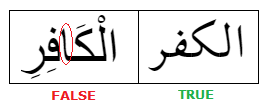TYPOS
The System 19 preserves the Quran in its original form and reveals the typos of letters in the copies.
68.SURA'S INITIAL LETTER(S)
In many copies, the initial letter of the 68th Sura is given as 'nun'. Suras with a single initial letter are associated with other suras that have their letter in combination, but the letter 'nun' is not in the initial letter combination of any sura other than the 68th sura. That is, according to the System 19, the 68th sura must have initial letters, not initial letter.
Investigations have proven the sign of the System 19: In the verse 21:87, the prophet Jonah is referred to as "zannun" (the person who has the letter 'nun'). The writing of the letter 'nun' in this verse is like it is voiced in Arabic (NooN/NuN); that is, it contains two 'nun' letters (ن ون). Therefore, the initial letter(s) of the 68th Sura should also be written in the form of 'nun' (ن ون).
SAD-SIN MIXTURE IN VERSE 7:69
The first researchers of the System 19 found that the total number of 'sad' as 153 in the suras 7-19-38. However, this number is not a multiple of 19 and is one more than 152 (19x8).
After numerous counts, one of the oldest copy (Tashkent), was examined and it was seen that the word "bastatan" was written with the letter "sin", not "sad".

Thus, it has been proved that in these suras there are a total of 152 (19x8) letter 'sad' and the word 'bastatan' in verse 7:69 should be written with the letter 'sin'. In most of the copies today, this word is written with the letter 'sad' but there is a small 'sin' above / below it.

OVER/MISSING ALIF LETTERS
Discussions on the use of 'Hamza' or 'lamAlif' signs instead of the letter 'Alif' and whether the words contain the letter 'Alif'; it caused errors in the writing of the letter 'Alif'. Sometimes it was written too much, sometimes it was written less.
For example the word "qafir"; while it should be written as "kfr", it was written as "qafr" using the extra letter "Alif". An example can be seen in 13:42 and 74:10.

A slightly more interesting example is found in 21:112. Again there is an extra use of 'Alif', and this usage; dictated the word that should have been "qul" as "qâle".
Word in verse 21: 112:
 “Qul”
form:
“Qul”
form:  “Qâle”
form:
“Qâle”
form: 
As can be seen, the word in the verse 21:112 is in the format "qul"; but with an overwritten letter 'Alif' it is misspelled as "qÂle". Except that the format necessarily indicates that it is "qul"; when we read from 21:10 to 21:112, it is clear that God was addressing the prophet Muhammad as "say".
21:108 Say: It has but been revealed unto me that your God is the One and Only God: will you, then, surrender yourselves unto Him?"
21:109 But if they turn away, say: I have proclaimed this in equity unto all of you alike; but I do not know whether that [judgment] which you are promised [by God] is near or far [in time].
21:110 He is fully aware of your public utterances, and He is fully aware of everything you conceal.
21:111 For all that I know, this world is a test for you, and a temporary enjoyment.
21:112 Say, "My Lord, Your judgment is the absolute justice. Our Lord is the Most Gracious; only His help is sought in the face of your claims.
*This error was not found thanks to the system 19. However, it revealed another mathematical harmony. When the error is corrected; the words "qul" (say) and "qale" (they said) occur in equal numbers (332 each) throughout the Quran.